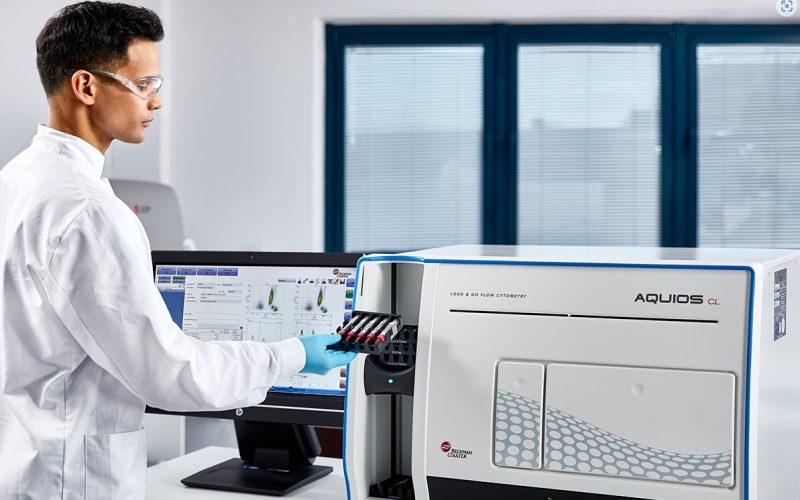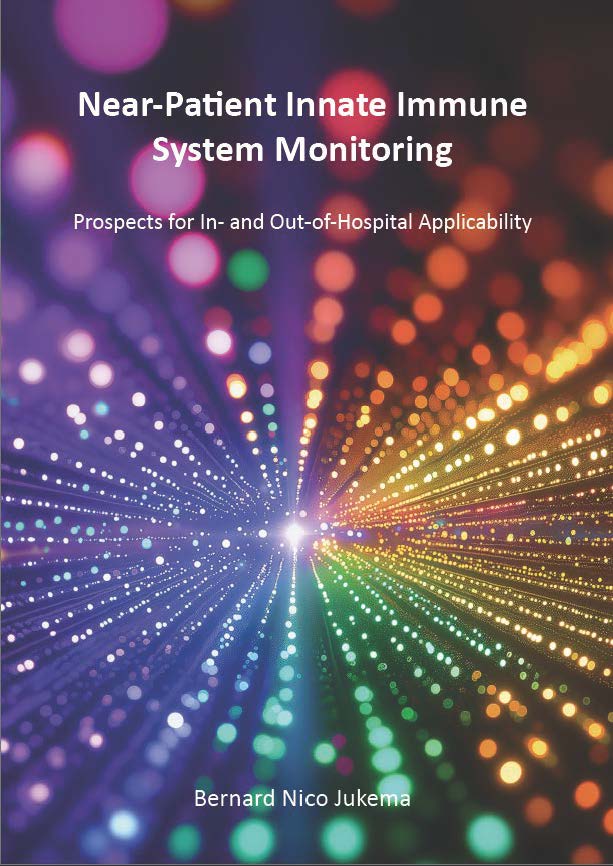Automated flow cytometry (AFC) with immediate analysis offers solutions to improve immune monitoring. In addition, routine implementation of AFC in the clinic has the potential to rapidly identify infections at the emergency department and to optimize the treatment of trauma patients. These were the main findings in the PhD research of Bernard Jukema (UMC Utrecht) who defended his PhD thesis on April 14, 2025 at Utrecht University.
The innate immune system forms the first line of defense against pathogens. Measuring the immune response provides valuable information on the current state of the immune system. For instance, whether an individual has an infection at the moment. Also, a balanced immune response is crucial since both a hyperactive and hypoactive response leads to an inadequate immune response with an increased risk of complications. By studying the innate immune system, better insight is gained into whether it is balanced or whether a patient is at risk of complications. This can then be applied clinically to identify, monitor and manage high-risk patients.
The PhD thesis of Bernard Jukema, MD (Department of Experimental Pulmonology and Center for Translational Immunology, UMC Utrecht) examined how automated flow cytometry (AFC) can assist in measuring the status of the innate immune system (specifically, neutrophils, eosinophils and monocytes). Flow cytometry is a technique for counting and examining immune cells suspended in a fluid stream. It allows for simultaneous multiparametric analysis of the physical and/or chemical characteristics of single cells flowing through an optical and/or electronic detection system. AFC has several advantages over traditional flow cytometry as it is easier to use, quicker and more accurate. By using AFC, innate immune system monitoring can be applied 24/7, with results being available within 30 minutes, making it point-of-care applicable.
Watch here a video featuring Bernard Jukema on the use of automated flow cytometry with help of a mobile laboratory
AFC was applied in research with healthy volunteers to better understand the innate immune response under various conditions and the effect of ex vivo activation of these cells. Ex vivo activation of the innate immune effector cells poses challenges for accurately and reliably measuring the innate immune response. especially outside hospital walls. Jukema investigated the feasibility of a mobile, automated, point-of-care AFC laboratory to mitigate ex vivo activation bias, by placing AFC inside a van. This approach offers potential solutions for improved, doorstep, immune monitoring, both inside and outside hospital walls, with minimal burden for the patient.
1 Infections
AFC was also applied in patients in a point-of-care setting to rapidly identify infections in the emergency department. It appeared that AFC was able to differentiate bacterial from viral infections already within 30 minutes, which is significantly faster than current common diagnostic practice which can take up to 5 days. This innovative approach for infection diagnostics has great potential for significantly impacting patient outcome and preventing the misuse of antibiotics.
2 Trauma care
In a study in trauma patients, distinct immunophenotype categories were defined, that consisted of different neutrophil subsets. These immunophenotypes can be used to identify trauma patients at risk for complications, such as infections, intensive care unit admission and mortality. Monitoring neutrophil immunophenotypes with AFC could support in rapid and personalized point-of-care decision making in trauma care.
3. Post-COVID
AFC also revealed specific mature neutrophil and eosinophil activation patterns in primary care patients with COVID-19 disease outside the hospital, during and 3-6 months after active disease. Results suggested that the neutrophil and eosinophil compartments are long-term affected by COVID-19, which indicates that these compartments may be involved in the pathogenesis of Post-COVID. However, two years after the initial disease, the neutrophil and eosinophils compartment seemed to have normalized and no correlations were found with persisting post-COVID symptoms.
“My thesis highlights the potential of innate immune system monitoring to enhance our understanding of innate immune responses and to support clinical decision-making.”
Bernard Jukema concluded: “My thesis highlights the potential of innate immune system monitoring to enhance our understanding of innate immune responses and to support clinical decision-making. Our examples represent just the initial exploration of the numerous potential applications where innate immune system monitoring could enhance patient care. One of the primary functions of the innate immune system is to provide a quick first line of defense against pathogens. Consequently, it is not surprising that our findings consistently demonstrate that innate immune system monitoring offers significant prognostic and diagnostic value for infections and clinical outcome.”
Bernard Nico Jukema, MD (1996, Duisburg, Germany) defended his PhD thesis on April 14, 2025 at Utrecht University. The title of his thesis was “Near-patient innate immune system monitoring – Prospects for in- and out-of-hospital applicability”. Supervisor was Prof. Leo Koenderman, PhD (Department of Experimental Pulmonology and Center for Translational Immunology, UMC Utrecht). Co-supervisor was Nienke Vrisekoop, PhD (Center for Translational Immunology, UMC Utrecht). Upon completion of his PhD project, Bernard started working as an occupational medicine resident at ArboNed Nederland in Utrecht.

